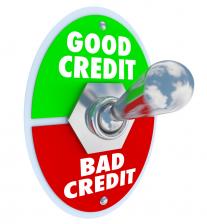Improve Your Credit Score
Getting approved for a loan at the best possible interest rate and terms.
Elizabeth Carlassare
Listen
Improve Your Credit Score

Getting approved for a loan at the best possible interest rate and terms depends on your credit worthiness. For a major purchase, like a house or a car, a lower interest rate can save you a lot of money over the life of the loan. So how do you find out if you have good credit, and what can you do to improve your credit score?
What Goes on a Credit Report?
First, credit reports explained: Your credit report shows your payment history for credit, including credit cards, student loans, car loans, and mortgages. If you’ve been late with payments, that information appears on your report.
A credit report shows the balances you owe and the amounts of your credit limits. It also shows other information, such as collection accounts and public records information like bankruptcies, tax liens, and foreclosures. Lenders use the information on your credit report as well as other information when they decide whether to lend money to you.
The Three Major Credit Reports
Even though people talk about their credit report or credit score as if there’s only one, you really have three major credit reports and scores: one from each of the major credit reporting agencies: Equifax, Experian, and TransUnion. Creditors report your payment information to each of these agencies. Your credit score sums up all the information on one of your credit reports into a single number that gives lenders a quick read on how likely you are to pay back a loan. Each credit bureau may have a different score for you because the credit history each one has for you may be different.
There are different credit scoring systems, but FICO scores are the most common. The scores range from 300 to 850, and most lenders consider scores that are 700 or better to be very good.
How to Improve Your Credit Score
So what action can you take to help improve your score?
The first is to pay your bills on time! This is the #1 best thing you can do to improve your score. Keeping your credit card balances low also helps boost your score. For example, a person with a $1,000 balance on a credit card with a $10,000 limit will typically have a higher score than someone with a $9,000 balance with the same $10,000 limit. Now, I don’t know where the actual sweet spot is, but I’ve heard that keeping your balances under half of the total credit limit can help improve your credit score.
A long credit history helps too. So, think twice before closing a credit card you’ve had for a long time and paid on time. To optimize your credit score, it’s best to keep your number of credit cards to four or less. More than that can pull down your score. And a mix of different types of credit helps. It’s better to have a car loan, a student loan, and a couple of credit cards, for example, than to have just several credit cards.
It’s also helpful to keep credit inquiries to a minimum. When a prospective lender pulls your credit, the inquiry is reflected on your credit report and can bring down your score. Don’t worry, though, about checking your credit report yourself. It doesn’t adversely impact your score.
Know Your Credit Score
In fact, it’s a really smart idea to check your own credit report before applying for a loan for a major purchase. Errors frequently appear on credit reports and can lower your score.
Unfortunately, I had to learn this one the hard way. When I applied for a mortgage, the lender told me that they couldn’t lend to me because of a 90-day late mortgage payment on my credit report. The date of the late payment was actually before I ever even had the loan!
As it turned out, I wasn’t the only one with this problem: a computer glitch of a big national lender (which I won’t name to protect the guilty) put false 90-day lates on lots of credit reports at that time. Fortunately, I was able to show that the 90-day late occurred before I ever had the loan and because that was clearly impossible, I was able to get approved for the mortgage I wanted.
If you do spot a mistake on your credit report when you’re looking it over, write to the credit bureau and the creditor reporting the error, and ask them to fix it right away. Be sure to request the correction well before applying for a loan. Credit bureaus have up to 30 days to investigate and respond to you.
You can get a copy of your credit report for free each year at annualcreditreport.com. You can also pay to get a copy as often as you like from websites such as myFICO Credit Scores or directly from the credit bureaus.
Cha-ching! That’s all for now, courtesy of Money Girl, your guide to a richer life.
Administrative
If you have a question or comment, you can e-mail it to money@quickanddirtytips.comcreate new email“>money@quickanddirtytips.comcreate new email. Also, check out the other Quick and Dirty Tips podcasts: Grammar Girl, Mr. Manners, and The Traveling Avatar. Thanks for listening!
Here are the websites for the Equifax, Experian, and TransUnion.
Good Credit Bad Credit image courtesy of Shutterstock
